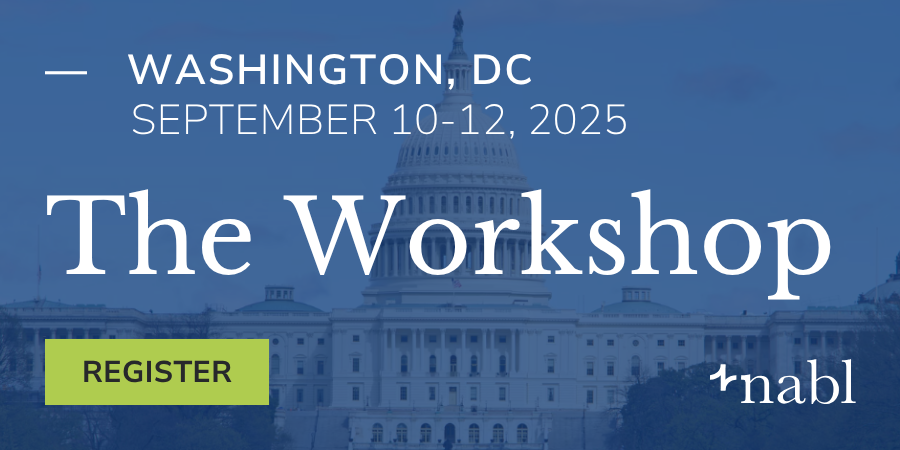- News
119th Congress Begins
The new Congress has begun with a long agenda on tap. Here’s what we know coming out of the gate.

By Brian Egan, Director of Government Affairs, NABL
Members of the 119th Congress were sworn into office and began the new session of Congress on Friday January 3, 2025. The Congress quickly confirmed the election of Donald Trump as the 47th President and selected Rep. Mike Johnson (R-LA) to continue serving as Speaker of the House. Now, Congress dives back into its regular work with a long list of high priority items to pursue.
Here are a few things to note from the start of the 119th Congress:
New Faces on Key Committees
Various congressional committees with jurisdiction over areas of bond law have already seen some shake up since the last Congress. Sen. Michael Crapo (R-ID) takes the gavel as chair of the Senate Finance Committee, which oversees federal tax law, including Section 103 of the Internal Revenue Code (IRC). Republicans have added Sen. Roger Marshall (KS) to the committee, and Democrats have five new faces joining: Senators Bernie Sanders (VT), Tina Smith (MN), Ben Rat Luján (MN), Raphael Warnock (GA), and Peter Welch (VT). Sen. Wyden (OR), who previously chaired the Committee, will remain its top Democrat as ranking member. The House Ways and Means Committee also welcomes several new members, including Rep. Rudy Yakym (R-IN) who serves as the co-chair to the House Municipal Finance Caucus.
Appointments
The Senate will spend the next weeks and months focused on reviewing nominations for key administration posts and judicial appointments. President-Elect Donald Trump has tapped Scott Bessent to serve as his Treasury Secretary, a role that has oversight over major portions of the U.S. economy, including tax-exempt bond regulations. The announcement that Bessent, who previously has managed several hedge funds, would serve as the incoming Treasury Secretary was greeted by generally favorable responses from financial markets.
Trump also announced that he would select Paul Atkins to serve as the next Commissioner of the U.S. Securities and Exchange Commission (SEC). Atkins, who previously served as an SEC Commissioner during the Bush Administration, was also welcomed by financial markets as a chair who would likely pursue less aggressive enforcement actions than his predecessor. Commissioner Jaime Lizárraga (D) is also expected to depart the SEC. Senate Republicans blocked a December attempt to reappoint Commissioner Caroline Crenshaw (D) to another term. Crenshaw’s term expired in 2024, but she may remain in her post for up to 18 months beyond the term’s expiration.
NABL will also closely watch several other nominations, including that of former Representative Billy Long (R-MO) to serve as the next Commissioner of the Internal Revenue Service (IRS).
“One Big, Beautiful Bill”?
All eyes are on the Republican party, which controls both chambers of Congress and the White House, as it charts a course and agenda for the rest of the year. An early disagreement arose late last year on whether leadership should push for a single large reconciliation bill or divide priorities across two reconciliation bills: one for the current budget cycle and another later this year once the next cycle begins.
President-Elect Trump seemingly endorsed a single bill approach, calling it “one big, beautiful bill,” but then clarified that while he prefers a single bill approach, he remains agnostic on the approach so long as it results in the same outcome. Republicans will now likely attempt to craft and pass a bill to tackle several major policy arenas. Political headwinds, however, could complicate their efforts.
- Debt Ceiling: Addressing the pending debt ceiling is the most pressing task for the 119th Congress. Secretary Yellen indicated that while the debt ceiling was suspended through January 1, 2025, federal budget technicalities have delayed the approach of the debt ceiling by a few weeks. Nonetheless, it remains likely the federal government will reach its statutory borrowing threshold in the coming days or weeks. Extraordinary measures will then likely sustain the federal government’s outlays for an additional few months, but the clock for Congress to address the debt ceiling before the x-date is ticking. Republicans made an intraparty promise in December to tackle the debt ceiling alone via a budget reconciliation process, adding urgency to get the process moving.
- Energy Policy: Congressional Republicans and President-Elect Trump have also committed to using budget reconciliation to pass a major energy bill to lower costs for American households and businesses. While the details of such a bill have yet to be determined, it would likely review and alter provisions of the Inflation Reduction Act (IRA) and potentially add new incentives for domestic energy production.
- Immigration: A host of immigration proposals have floated through recent Congresses, including the Laken Riley Act, which passed the Senate on January 8, 2025. While there is growing bipartisan consensus on certain policy proposals, immigration has been a highly elusive policy area for Administrations on both sides of the aisle.
- Tax Reform: Addressing the expiring provisions of the Tax Cuts and Jobs Act (TCJA) of 2017 remains one of the highest priorities for the 119th Congress. Disputes on the total cost of a package, how to account for the cost, how or even whether to pay for the package, where to set tax rates, and what if anything to do about the cap on the state and local tax deduction are just some of the topline items that need to be resolved before legislative text can be drafted and passed. Municipal market participants and advocates continue to emphasize the need for advocacy in Congress and with the Administration to support affordable community finance and the tax-exempt bond market.
What it all Means for the Muni Market
Compiling all these priorities into one bill and tying it to a time-sensitive debt ceiling debacle will speed up the legislative process for the new Congress’ priorities. It will also limit time for negotiations and deliberation. More importantly, it introduces risks that such a massively large package may not clear the incredibly narrow thresholds required in both chambers. Pending additional intra-term races, Republicans cannot afford to lose more than three votes in the Senate and two in the House. Tackling so many historically difficult topics in one bill adds a great deal of uncertainty in whether leadership can find a compromise that holds the caucus unanimously together.
NABL encourages members and other municipal market stakeholders to start and maintain dialogues with their federal decision makers now. Next week, during our Advocacy Townhall on January 16, we will launch our 119th Congress Policy Platform Primer and other resources to aid in your advocacy during this critical year.
